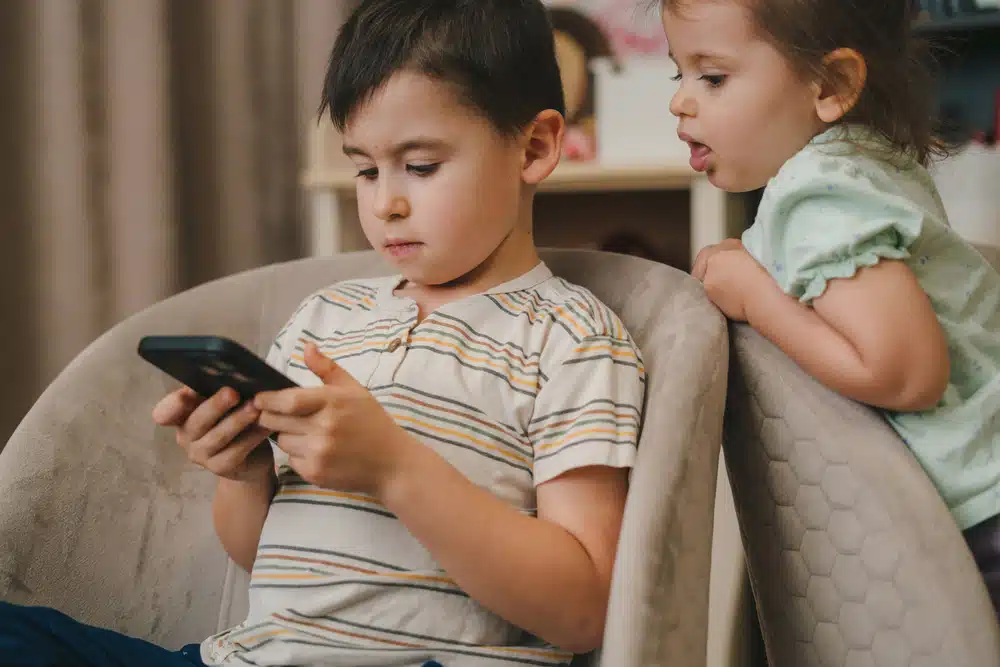Article At A Glance:
- Excessive screen time in children causes sleep issues, irritability, and cognitive challenges.
- Signs include disinterest in activities, difficulty focusing, and behavioral changes.
- Limit screen use with parental controls, disabling notifications, and screen-free zones.
- Promote creative and physical activities as fun alternatives.
- Use rewards to encourage and maintain reduced screen time habits.
You love your little ones more than anything and want them to thrive. In the world, though, nearly everything is going digital. Does it feel almost impossible to pull your family away from the screen?
There’s nothing wrong with sitting down and watching a movie together or bonding over video games, but screen time addiction in children is a real problem. The American Academy of Pediatrics says that kids shouldn’t spend more than two hours in front of a screen (outside of homework or school), but around 85% of kids do so. The problem is that screen time addictions cause psychological stress in your children, whether they’re in kindergarten or high school.
Of course, another challenge is breaking the addiction. You can’t simply make them quit cold turkey when it’s all around them and required of them in school. What can parents do about overcoming screen addiction, then?
Below is more about how the right approach—and patience—can incrementally reduce your child’s screen time and help them overcome this common addiction.
Signs of Screen Addiction in Young Children
First, how do you determine whether your child has a screen addiction? The confirmation requires more than simply counting the hours that they’re spending in front of a television or mobile devices.
Screen addiction in young children can impact different areas of their lives. If you notice any of the following signs from your child, it’s time to act:
- They don’t have any interest in other activities.
- They’re struggling to sleep.
- They seem angrier than normal.
- They argue or cry when you take their device away.
- They struggle to focus on certain tasks.
- They have increased self-esteem issues or anxiety.
Acting on these signs fast could be crucial to your child’s overall health and well-being. Too much screen time has the potential to lead to other difficulties, like obesity and anxiety. However, perhaps the most worrisome problem screen addiction could create is impaired cognitive development.
According to a piece published by CBS News, studies suggest that children who spend more than the recommended two hours in front of a screen score lower on language and thinking tests. Screen time is not all bad, as some screen-based programs, like educational shows, can actually help children improve their social behaviors and academic performance. Still, the key is finding the right balance.
Additional Read: Creative Activities To Develop Fine Motor Skills in Preschoolers
Strategies for Reducing Screen Time for Children
Screen time addiction in children can be challenging to overcome, but take heart; it isn’t impossible! You can help your child reduce screen reliance and take advantage of everything else their young life has to offer. Use these helpful screen addiction tips to break the habit and achieve a healthier screen time balance for your little one:
Use Parental Controls To Set Screen Time Limits Kids Can’t Skip
Overcoming screen addiction is a widespread issue that families and even companies are navigating. This is part of the reason why devices offer parental control settings that allow you to set limits for things like:
- How much time your child spends on a device
- What type of online content your child can access
- What websites a device can access
Setting strict limits on the device ensures that your child is engaging in safe content and games without spending too much time in front of the screen. You can also set limits outside of the device by establishing time frames for when they can or can’t access a device or creating screen-free rooms for them to play in. For example, you can turn their bedroom into a device-free room (if you do this, always offer other activities like crafts, books, or toys).
Disable Notifications From Distracting Social Media Apps or Games
Social media, whether major platforms or fads, is one of the biggest contributing factors to children’s increasing screen time. Even if your child isn’t actively on a device, these platforms can send notifications that make them want to check their profiles and spend time scrolling. Disabling these notifications can help prevent this, so they won’t have to deal with potential distractions while doing other activities, like homework or time with friends.
When disabling notifications for social media on your kid’s device, do the same for games. Some apps and online games like Minecraft or Fortnite will send notifications to remind the user to play a round, which you certainly don’t want when managing screen time for your child. Disabling these notifications and setting specific times for your child to play these games or check their social media accounts can help curb their screen addiction.
Motivate Them To Explore Enjoyable Activities Off-Screen
Online games, social media, and television shows are all sources of entertainment that your child actively seeks as they grow and develop. When breaking screen time addiction in children, it can be incredibly helpful to replace their screen time with other engaging activities.
What does your child enjoy? What interests them? For example, if they like being creative, give them some craft supplies and let their imagination run wild.
You can also encourage them to do more outside the house by taking them to the local park or signing them up for athletics.
Reward Your Kids for Less Screen Time
Positive reinforcement is a great way to help your child break a habit. You can also get creative here.
Talk to your child about why reducing screen time is important and how you will do it together, then offer rewards to keep them motivated. For example, say part of your screen time reduction plan includes not allowing your child to play on their phone or watch television before bed. If they do this for the first week, you can reward them by letting them choose a fun activity for the weekend or picking out a tasty treat at the local ice cream shop.
Think about what your child likes, set goals, and show them all the benefits of spending less time in front of a screen.
Additional Read: Explore The Benefits Of Outdoor Activities
We know that when it comes to needing to break kids’ screen habits, it’s easier said than done. The tips above can help you reduce screen time and help your child find enjoyment in other things, as long as you stick to it and remain patient.
Perhaps the best way to encourage your child to reduce screen time is by setting an example. Are you addicted to your own screen as an adult? Whether you’re scrolling through social media profiles, playing games, or watching shows, your children learn by watching you.
Why not join your child on their screen-reduction journey by setting limits for yourself and participating in other activities with your children? This won’t just help you beat screen addiction – it’s quality bonding time you’ll both love!
At Bubbles Academy, we fully understand the unique challenges parents face when trying to overcome screen time addiction in children. We want to encourage you to stop by and explore all the fun and engaging classes we offer for young kids or chat about some strategies. Why not register your little one for a free trial class by calling Bubbles Academy at (312) 944-7677 today?

